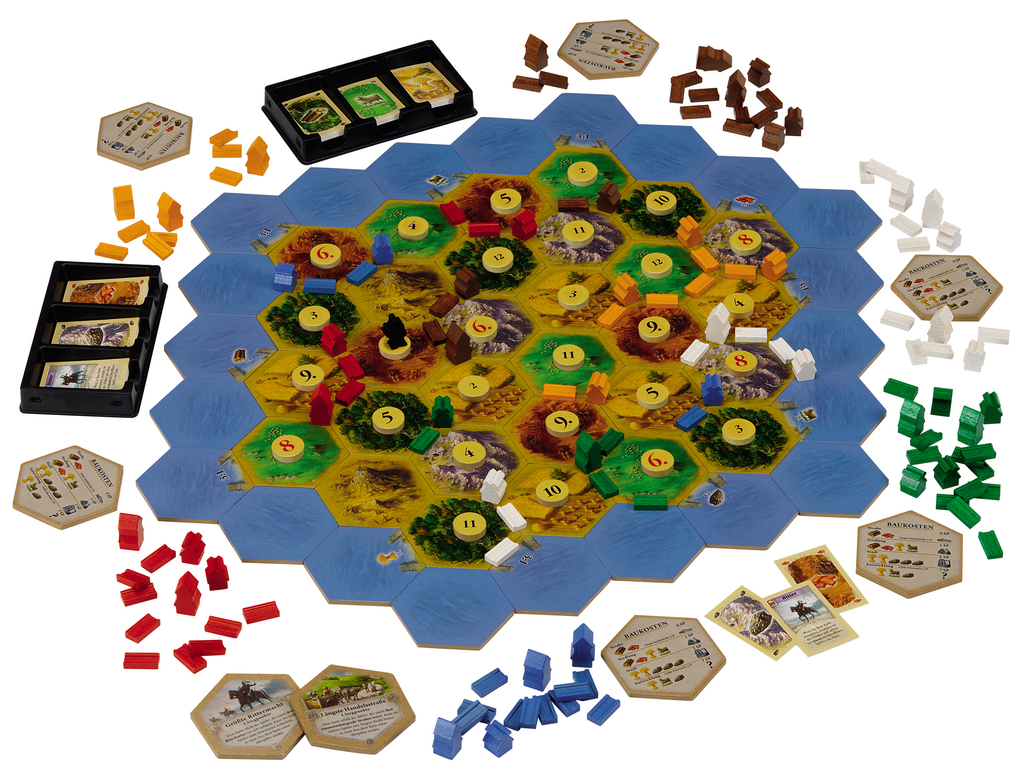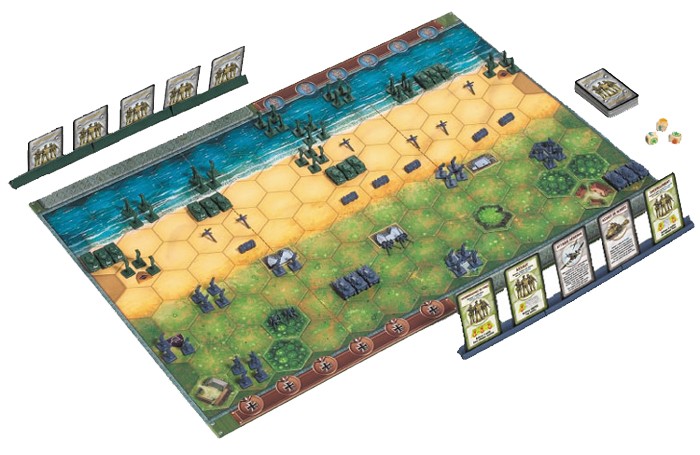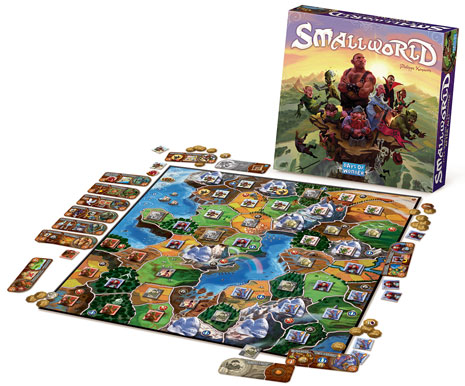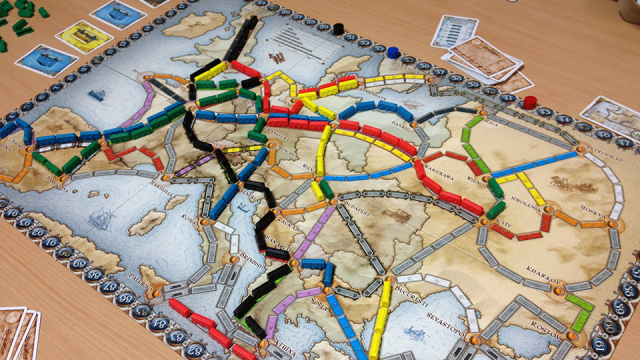“Part of our brand,” explains the sonorous French voice on the phone, “is coming from the fact we do very few things. Porsche is the most successful car company in the world from the business standpoint, but they do very few models… we take the same approach in the board game business.”
Yes, board games. Joint US-French publisher Days of Wonder are keen to tell me of a dramatic development in the sleepy burg of board games. They say their flagship title, family train game Ticket to Ride, has overtaken Settlers of Catan in sales. If they’re right, that’s huge.
Catan is a quaint German game where players compete to develop a hopelessly cramped island. Fretting and plotting over hands of resource cards, players compete to snatch territory from one another, negotiate, and thread together their holdings to lay claim to the hotly contested Longest Road. It’s basically Sim City in an elevator. It’s also irreducibly pleasant, its flimsy rules equal parts simple, rewarding and clever.

More importantly, in board games, quaint sells. Catan is the bashful possessor of more than one hundred sequels, expansions, spin-offs and tie-ins. It also had a key role in the reinvigoration of the US board game scene in the mid-90s, when Americans encountered such staggering revelations as board games with colour manuals and themes that didn’t include (1) guns or (2) laser guns.
Catan is the bashful possessor of more than one hundred sequels, expansions, spin-offs and tie-ins.
Perhaps what’s most remarkable about Days of Wonder’s Ticket to Ride is how similarly unremarkable it is. Faced with a map of a continent and bare train tracks, players are dealt route cards they have to try and complete. On your turn, you can either draw more route cards, draw railway car cards, or play sets of railway car cards to complete routes on the board, often causing at least one of your friends to howl in terror / pain / fury because they needed that one.
Like Catan, it’s a subtle blend of empire development and passive aggression, and pleasant without being daring. Talking to Days of Wonder, I wanted to discover what guided a company that could dethrone Catan. As it turned out from a quick chat with founder Eric Hautemont, the company’s Porsche-like attitude of releasing a 0-1 games a year was just the start.
“From a brand standpoint, we sat down really early on and thought about what are the key things that would distinguish a Days of Wonder game. At the time — think back to 2001, 2002, board games were not that attractive. They were kind of thrown together, people were doing their own graphics, their friends were doing design… We wanted to really emphasise both the componentry in the game and also the illustrations.
“Our first big-box game, Mystery of the Abbey — one little thing that we added was this little bell, to call people to mass which happens after so many turns. That little bell, which probably cost six or seven cents, people raved about it. Because it wasn’t necessary, you could have just said ‘okay, everyone all go to Mass,’ but it was that little added touch that helped move the storyline along.”
Since then, it’s become inarguable that Days of Wonder make the nicest physical objects. In an industry of plastic miniatures that arrive knock-kneed and wielding bent swords, of that literally blacken your hands, the competition might not be fierce, but Days of Wonder games still offer a tidy kind of luxury. Colourful art and a wealth of injection-moulded plastic, tucked tightly into a rigid inlay.

What’s more telling, though, is Eric’s mention of brands. The board game scene is commendably quick to adopt new settings and ideas, to invent and reinvent in a spin cycle of cardboard and creativity. But from a financial standpoint, it’s basically terrible at developing and maintaining brands and universes. Again, competition might be lax, but Days of Wonder has displayed a unique gift for making customers into fans.
The board game scene is commendably quick to adopt new settings and ideas, to invent and reinvent in a spin cycle of cardboard and creativity.
The company’s swift release of a gorgeous Ticket to Ride app in early 2011 sent board game publishers scrambling into action, eager to monetise their games on other platforms in the same way. But to Days of Wonder, the app isn’t about other revenue streams. It’s about developing the Ticket to Ride name.
“It is easier to sell a cardboard edition of Ticket to Ride at 50 bucks,” Eric explains, “than it is to sell a digital version of Ticket to Ride at 7 bucks. It’s more difficult if you want to sell lots of copies quickly, but the cardboard business is where you can achieve… successes that will last a lifetime, or several lifetimes, but you need to be willing to go slow.”
“…the cardboard business is where you can achieve… successes that will last a lifetime, or several lifetimes, but you need to be willing to go slow.” – Eric
Of course, this kind of stellar presentation will only get you so far. Finding the games themselves is surely the secret sauce of any board game publisher. These days, Days of Wonder have a solution as different as everything else they do: To not look at all.
Eric explains that in its early years, Days of Wonder had a page on their site allowing people to submit designs. Several years and countless playtesting sessions later, they noticed something funny. They’d never actually accepted a single one.
It’s a sad truth echoed by the wash of mediocre board games that, long since funded, are now emerging from Kickstarter. Board games are hard, and talent is rare. “I said screw it,” says Eric.
“The current policy we have is to tell designers I’m sorry, we’re not taking any open submissions…. But if you’re really good and you have great design, you should be able to find someone who knows us, and who is going to convince us.”
In other words, Days of Wonder’s policy is now to close and bolt the doors, and see what comes in the window. A decision that led to 2009 smash hit Small World. Never in board gaming has a game of crushing and deeply personal area control been so cute.

…and still more curiously, a decision that’s the polar opposite of Fantasy Flight, the other biggest name in board gaming. As gregarious as Days of Wonder are aloof, they’re currently possessing the licenses for Star Wars, Warhammer, Lord of the Rings, Star Wars, Lovecraft, three of their own universes and any classic system they can get their hands on, often putting out a release each week. “They only have the licenses for a short while,” he explains, “And they make the most of them.”
I can hear Eric’s smile down the phone as he talks about how he couldn’t possibly talk any more about them. It’s evident that he’s happy with his one game each year, and his own company’s policy of never passing 20 employees. A cool French tortoise to Fantasy Flight’s American hare.
“I saw an interesting chart of the sales of records in the US. If you look at vinyls, the sales of vinyls in 2012 were 10 times what they were in 1995, and they were 3.5 times what they were in 2003. But what’s interesting is I think we see the same thing on the board game side. The more the big companies push to an all-digital world, the more what we do stands out as special and unique, and that’s just one example.“
Days of Wonder recently announced their newest title, the Indiana Jones-flavoured Relic Runners, will be released later this year, and — surprise! — it looks absolutely gorgeous.
No need to put your pre-order down just yet, though. The company’s 2011 release of the underwhelming Cargo Noir proved that if they are the Porsche of game designs, they’re just as capable of releasing models. If Eric curious about what distinguishes a Days of Wonder game? Let’s hope it doesn’t become style over substance.
Quintin Smith is a games columnist able to identify different board game manufacturers by their scent. He is not proud of this. He’s part of a team working to make a home for play in Shut Up & Sit Down, and @quinns108 on Twitter.

Comments
3 responses to “The Porsche Of The Board Game World”
Yeah Cargo Noir is probably the only ‘meh’ Days of Wonder game I have played, the rest are fantastic! If I don’t know which board game to buy next I usually look for the Days of Wonder logo.
i have a lot of their ios conversions on my ipad – ttr is fun against my mates all around the world 🙂
I still play smallworld and its expansions every couple of weeks, good funs 🙂